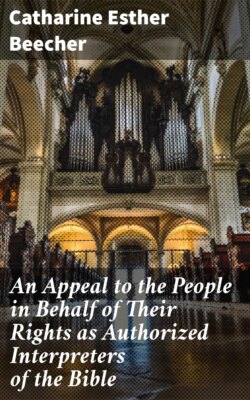Читать книгу An Appeal to the People in Behalf of Their Rights as Authorized Interpreters of the Bible - Catharine Esther Beecher - Страница 33
На сайте Литреса книга снята с продажи.
Catholic Mode.
ОглавлениеTable of Contents
The Catholic mode is that of mystery and sovereignty, and is based on the assumption that the mind of man, being utterly depraved, has no capacity to judge of what is right and wrong.
According to this, the most abominable and horrible crimes are to be considered virtues if God should commit them, or should teach us that they are so.
Among the most distinguished of the Catholic theologians is the learned Abelard, who teaches thus:
“Would it not be deemed the summit of injustice among men, if any one should cast an innocent son, for the sin of a father, into those flames, even if they endured but a short time? How much more so if eternal? Truly I confess this would be unjust in men, because they are forbidden to avenge even their own real injuries. But it is not so in God, who says, ‘Vengeance is mine, I will repay;’ and again, in another place, ‘I will kill and I will make alive.’ Now God commits no injustice towards his creature in whatever way he treats him—whether he assigns him to punishment or to life.... In whatever way God may wish to treat his creature, he can be accused of no injustice; nor can any thing be called evil in any way if it is done according to his will. Nor can we in any other way distinguish good from evil, except by noticing what is agreeable to his will.”
[pg 029]
Another celebrated Catholic theologian, “the good Pascal,” thus disparages our natural sense of justice as “wretched,” and of no account before this awful doctrine.
“What can be more contrary to the rules of our wretched justicethan to damn eternally an infant incapable of volition, for an offense in which he seems to have had no share, and which was committed six thousand years before he was born? Certainly nothing strikes us more rudely than this doctrine; and yet without this mystery, the most incomprehensible of all, we are incomprehensible to ourselves.”
Thus it is seen that Pascal concedes it as a truth that infants are to be eternally damned for offenses in which they “seem to have no share,” and that our sense of justice, which revolts from it, is “wretched.”
The Andover Theological Seminary was the first one established in New England for educating ministers, and for nearly half a century Dr. Woods filled the leading theological chair. The following is introduced, from the Conflict of Ages, to verify the statement that the Catholic mode of mystery and sovereignty was the method adopted by him in training the clergy of New England on this subject.
“He [Dr. Woods] expressly teaches that there is in the nature of man, anterior to knowledge or choice, a proneness or propensity to sin, which is in its own nature sinful, ‘the essence of moral evil, the sum of all that is vile and hateful.’ He also teaches that God inflicts this ‘tremendous calamity’ on all men for the sin of one man. ‘This,’ he says, ‘has been the belief of the church in all ages.’
“He then asks, ‘But how is this proceeding just to Adam's posterity? What have they done, before they commit sin, to merit pain and death? What have they done to merit the evil of existing without original righteousness, and with a nature prone [pg 030]to sin? Here,’ he says, ‘our wisdom fails. We apply in vain to human reason or human consciousness for an answer.’ Nay more; he even admits that such conduct is ‘contrary to the dictates of our fallible minds.’ Yet he still insists that we ought not to judge at all in the case, but to believe that it is right because God has done it. ‘God has not made us judges. The case lies wholly out of our province. It is a doctrine which is not to be brought for trial to the bar of human reason. Mere natural reason, mere philosophy or metaphysical sagacity transcends its just bounds, and commits a heinous sacrilege, when it attacks this primary article of our faith, and labors to distort it, to undermine it, or to expose its truth or its importance to distrust.’”
The preceding serves to establish the correctness of the writer's statements as to the modes of meeting difficulties adopted by theologians.
In the next chapter we shall see that none of these methods prove satisfactory even to theologians themselves.
